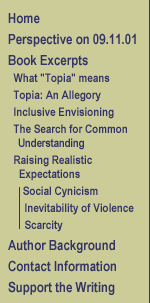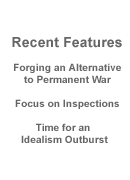

| If we have the capacity to dramatically reduce the violence in the world to the degree that a revolutionary social transformation could be said to have taken place, then we ought to begin. |
All rational people agree that maximum effort needs to be made to stop the the perpetrators of the September 11, 2001, attacks from continuing to plan and carry out acts of mass murder. That is a given. But, we should not succumb, in the process, to the motive of revenge, or support the current policies of the Bush Administration, of permanent war in the name of peace, and the curtailment of civil rights in the name of freedom. The proper response to the attack is to stop more mass murder from occurring, not to commit it ourselves, or to dismantle the very freedoms we are supposedly trying to defend. Like a mantra, we need to repeat, over and over, the wise words of Nathan Baxter, Dean of the National Cathedral, speaking a few days after 9/11. He said that we must make every effort, as we act, to "not become the evil that we deplore."
We need to do away with the notion that justice involves revenge. Those who plot mass murder should be stopped. Stopped is the proper verb, not destroyed, not obliterated, not assassinated, not tortured.
The second half of this same equation (there may be a third or fourth half in time) is that initiating mass violence (i.e., starting wars) is not the way to curtail the spread of mass violence. Destroying bodies is not the way to stop people from destroying bodies. This is the same argument as the one against the death penalty: "Why do we kill people to teach people that killing people is wrong?" It applies to nations and international networks of terrorists as well as it applies to individuals.
At some point, we have to heed Einstein's advice that a problem cannot be solved at the same level of thought that created it. Einstein also said that "“(t)he release of atomic energy has not created a new problem. It has merely made more urgent the necessity of solving an existing one.” We might now add, with regard to the spread of weapons of mass destruction, that the problem has become more urgent.
But, the larger existing problem to which he referred, I believe, is that humanity has not yet evolved to the point where we resolve conflicts without resort to physical force. To reach the point where nonviolent methods of resolving conflict becomes the global norm will require a wide and deep revolution of consciousness that goes well beyond the violence question. But, if the choice, as Martin Luther King, Jr. put it, is between nonviolence or non-existence, then, well, maybe we'd better think a little more about nonviolence.
The point is: If we have the capacity to create real and meaningful change in the world, to become active co-creators of the world rather than passive receptors or consumers of social reality; if the basic directional goal of life is to achieve happiness and reduce suffering; if we have the capacity to dramatically reduce the violence in the world to the degree that a revolutionary social transformation could be said to have taken place; then we ought to begin.
But, no matter how much we wish it, the world won't turn on a dime. We can't wish away the hatred in the world. And in a situation as difficult as this, it may be almost impossible to stop our current government in the short term from acting out of motives of revenge, from over-militarizing our response to the situation, from alienating much of the rest of the world so sympathetic to us in the days after the attack and who now view America as being as big a problem as al-Qaida. But, we can begin to create a better response from the citizen level, one that involves using the events of 9/11 to make ourselves better people and better the world as a whole. We can rise to the occassion, and reverse the slide to our lowest impulse.
So, how can we frame our individual responses to the current moment in terms that help to futher universal compassion and the related values of global human rights, nonviolence and celebration of human diversity?
Addressing
the Causes of Terrorism
It is important to begin to understand the factors that cause some people
to see groups like al-Qaeda as somehow representing the fulfilment of
their needs and aspirations. A metaphor that has been repeated often in
the media during the last months has been that the United States and its
allies need to "drain the swamp" that feeds terrorist networks,
the analogy being to killing off noxious insects by draining the bodies
of water in which they breed. In a military mindset, this means drying
up the sources of logistical support for the terrorist networks. But,
the "draining the swamp" metaphor has a potentially richer connotation.
Beyond any police or military action, a proactive approach to preventing
future terrorism would involve addressing the social, economic, political
and cultural contributors which lead people to homicidal and suicidal
acts to advance political or politico-religious objectives. A useful analogy
can be made here to the response by communities around the United States
to school-based killing sprees such as occurred at Columbine High School
in Littleton, Colorado. Recognizing that the perpetrators of such acts
are often the victims of extensive and long-term verbal and physical bullying
and harassment by their peers, educators and public health leaders have
promoted school-based diversity education, community building, and conflict
resolution training as part of their longer-term violence prevention strategy.
To respond to international terrorism, the world can adopt a similar strategy.
As in the case of youth violence, recognizing and addressing some of the
underlying causes of the September 11 actions does not justify or legitimate
the actions themselves.
There will likely always be individuals and movements that will utilize religion and other ideologies to justify violence. Most people, however, if they are living relatively happy, sanguine, existences, will not be persuaded to join or support such movements. The best way to drain the swamp that creates violence, including international terror, is to create a world in which injustice and deprivation are reduced to a point that they don't create a crucible for such behaviors. So, the movement against terrorism ultimately needs to be one that addresses the issue of human rights on a global scale, reducing poverty and oppression to the degree to which is necessary to reduce the reactive violence that often accompanies them.
A Better World Order
In short,
to drain the swamp that breeds terrorism, we will have to create a better
world order. In the phrase that has been adopted by the peace and social
justice movements, "another world is possible, and we pledge to make
it real."
There is no avoiding the fact that we do and will increasingly live in
some global world order. It is as impossible to construct a truly
anti-globalization movement as it is to turn back time. The choice that
we do have is the nature of that world order, the form that globalization
will take. Our challenge is to create a vision of the world that is large
enough to include the (nonviolent) dreams of every human being. There
is no question that this will be a difficult challenge, but it is not
an impossible one. A first step will
be to get our heads around the sheer size of the idea. In other words,
we need to think and act as world citizens.
So, what can we do? How can we truly become world citizens and help to create a better world order based on universal compassion? A first step is to educate oneself as to the already existing efforts in that direction, and then find some way to contribute to those efforts, or to create new efforts along the same lines.
There already exists a global movement for universal compassion that takes the form of thousands of nongovernmental organizations located everywhere in the world. As time goes on, this website will provide a wide variety of internet links and other resources that will help identify this movement. But, for the sake of providing initial resources for those who are newly involved, below are several links to just a few nongovernmental organizations made up of ordinary citizens that are helping to advance the cause of universal human rights:
Amnesty
International
Doctors Without Borders
Drop
the Debt Campaign
Human Rights Watch
International Federation of Red Cross and
Red Crescent Societies
For
us to take action toward the creation of a new world order based on principles
of compassion, justice and peace, we have to believe that such goals are
realistic. A principal purpose of The Politics of Universal Compassion
is to challenge commonly held beliefs about human nature and the human
potential that limit people's initiative toward universal compassion by
foreclosing their hopes for the achievment of a more compassionate world.
|
|